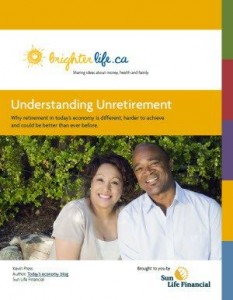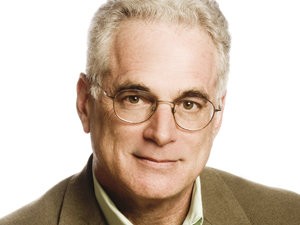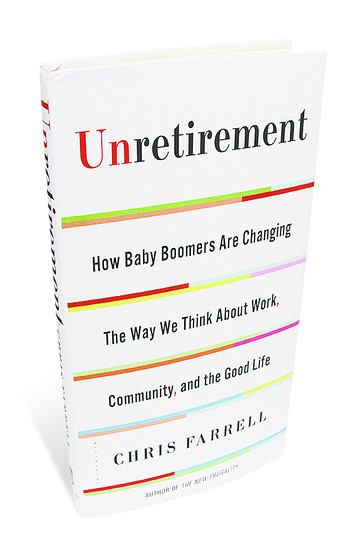Unretirement is a concept not unlike Findependence or Financial Independence; it’s also the title of a recently published book by Chris Farrell, Bloomberg Businessweek columnist and senior economics contributor for American Public Media’s syndicated radio show, Marketplace.
I’ve also seen the term Unretirement used by Sun Life Financial in Canada but that seems to be more a marketing term the company uses to promote its surveys on traditional retirement. That survey has been going for six years now, which certainly predates the publication of Farrell’s Unretirement (it was published in 2014 by New York-based Bloomsbury Publishing plc).
The theme of the book is encapsulated in the title of the opening chapter: Work Long and
Prosper. As we’ve noted in in this site’s Aging & Longevity section, advances in life expectancy suggests the Baby Boomers and succeeding generations may work long past the traditional retirement age of 65.
True, many boomers may no longer be employed by giant corporations — either because they choose to leave or are involuntarily parted from such employment — but Farrell sees most of them becoming free agents of some sort: finding new “encore” careers, starting new businesses or contracting their services back to former employers while adding other clients, volunteering and philanthropy, among other activities.
Five pitfalls related to Longevity

Farrell sets the stage by outlining five pitfalls from a retirement planning report from Stanford University’s Center on Longevity:
Pitfall 1: Failing to Plan
Pitfall 2: Underestimating Expenses
Pitfall 3: Underestimating Years in Retirement
Pitfall 4: Retiring too Early
Pitfall 5: Failing to Save Enough
Farrell maintains that this “seismic change” is still in its early stages of unfolding.
Ageism in workplace may force aging workers to embrace Unretirement
Of course, many baby boomers are encountering ageism in the workplace, so even if they do plan to keep working and saving, they may find that once they exit from the corporate world, it may be difficult to find a similar situation at the same level of compensation and benefits. “Companies don’t like older workers,” one source tells him, while another notes that “Working longer assumes that there is work.”
It may be necessary to strike out on one’s own, like it or not, but Farrell is optimistic about where all this is headed:
“The rise of unretirement is good news for the economy’s vitality, the material well-being of individuals in life’s third stage, and for shoring up the financial health of the social safety net.”
He cites several case studies that demonstrate the tradeoff between earning a high salary but retiring early, versus working longer for a lower salary. For the most part he is of the view that Americans should strive to keep working in some capacity until age 70 or so, delaying the receipt of Social Security benefits till then and thereby doubling their benefits. The new retirement planning mantra, he argues is “Encore jobs, networking, and delaying filing for Social Security benefits.”
But what about the old canard that the Boomers need to leave corporate employment to make way for the younger generations? Far from taking jobs from younger workers, one economist tells Farrell that these Boomerpreneurs (my term) “may be creating jobs for them.”
The Rise of Mass Retirement
The book includes some interesting historical background to Retirement, going back to the familiar precedent of Germany’s Otto von Bismarck creating the first social insurance program for the elderly in 1889. But he goes even further back: did you know one of the first pension plans in the United States goes back to 1759 for the families of Presbyterian ministers, or the first formal corporate pension by American Express Co. in 1875?
But it wasn’t until the Great Depression of the 1930s that the next great phase of modern retirement began. This was of course the birth of Social Security in 1935. More corporations started to offer Defined Benefit pensions and health care benefits and so, Farrell writes, “A new leisure class was born: the retired person.”
However, Madison Avenue’s depiction of what this new class actually experienced left something to be desired. Apart from the fact that not everyone enjoyed such pensions, many who did soon found it hard to be put out to pasture. At one point, Farrell describes one of the first retirement communities and added the ironic note that the founder himself would rather work than enjoy the full-time leisure his community provided.
From there he moves on to a discussion of “Third-Age Entrepreneurs.” Typical is the following quote by Jan Hively, who got a Ph. D. at age 69 and created three non-profits, including the Vital Aging Network:
“My focus shifted to the meaning of work. Living well and working well is a lifelong effort. My mantra is to take meaningful work — paid and unpaid — to the last breath.”
Choose your term
I can’t resist closing with the following quotation about my own preferred term, Financial Independence, a term that does sneak into a few spots in the book. According to certified financial planner Ross Levin:
“… That’s what financial independence is. You don’t have to answer to anyone because you have enough.”
So which term do we use: Retirement, Unretirement or Findependence? See this Hub blog from last week for more on that.


